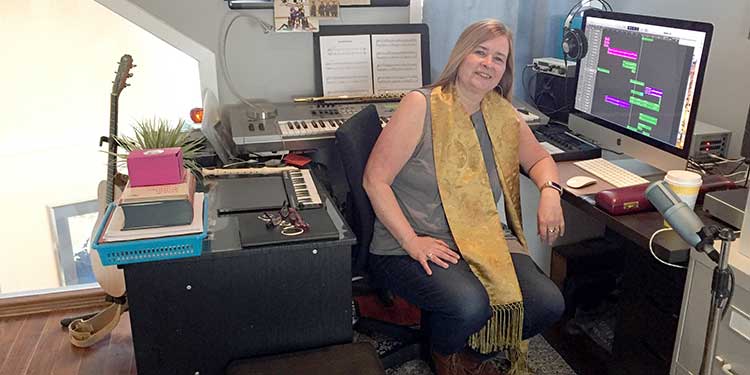Latest News
Teaching career has been music to Garrett's ears

In Susan Garrett’s Grade 5/6 class at Spul’u’kwuks Elementary School, music has woven its way into nearly every subject.
Pieces like Garrett’s orchestral and cinematic composition “WONDER” might accompany a creative writing exercise.
Other times, students will listen to a song that Garrett has written for their Social Studies class, such as “Sing For Sudan,” which addresses the water shortages in the country.
“It (music) opens the brain, and makes it fire,” said Garrett.
She has also directed Spul’u’kwuks’ choir and 150-student band since joining the school in 2014, after teaching at Westwind Elementary School.
“When I do that, the product is so much more creative. Some of them have come up with amazing things if you give (them) the freedom to do that.”
Garrett, who began her teaching career in 1987, will be retiring from classroom teaching in June, mainly to free up more time to write songs and compose.
While Garrett will continue to teach Spul’u’kwuks’ music program, she says that she will miss the opportunities to teach new classroom topics with creativity.
The teacher-composer currently sits at No. 1 of the Children’s Music category on ReverbNation, with songs that often draw from Canadian history or social issues.
On the computer in Garrett’s recording studio, audio tracks for her upcoming song “Erased,”—which is about the now-extinct Beothuk people—are ready to be mixed and edited.
Unlike many music teachers, Garrett also teaches subjects like Social Studies, English, and art, and her songs have formed an important part of her entire curriculum.
“I like the connections with the kids, because you’re there all the time, and you get to know them,” she said, adding that she will miss these connections when she retires from classroom teaching.
Garrett had a positive presence, and she accepted all the unique and quirky personalities in the classroom, said John Kibblewhite, who became the principal of Spul’u’kwuks in January 2017.
“It was very evident how much the kids loved her, and she was very warm and fair,” said Kibblewhite, who has taught science in Garrett’s class before.
Garrett’s father and mother were both folk singers, and she took her first ukulele lessons from her father.
Garrett would go on to earn a performance degree in Jazz Studies at Western Washington University.
But recognizing that she was more interested in teaching than performing gigs, Garrett continued her studies at the University of Washington, where she would graduate with a degree in education and flute performance.
As part of the practicum of her education degree, Garrett taught at a middle school in the suburbs of Seattle, which became an “eye-opening experience.”
“Kids were getting stabbed in the school and teachers would get punched. And the kids would sit (with the) black kids on that side, and white kids on that side. And being Canadian, we don’t think that way.”
The experience transformed her perspective on education.
“I realized being at the practicum, that there was lot more to teaching music than just ‘teaching music.’”
Garrett has written compositions for choir, band, as well as two musicals, including “We Are Canadian,” which was performed by Spul’u’kwuks students at Gateway Theatre.
“That becomes a huge, massive endeavour to bring that giant group (of students) together,” Garrett said.
“But it’s so powerful. You can just see how they feel.”
Despite the logistical and pedagogical challenges of elementary school concerts, Garrett could direct and produce “high school quality band concerts,” says Kibblewhite.
“What she could get out of her kids was really amazing,” the principal said.
“Our kids are talented, but to pull them together as an elementary school band was really outstanding.”
Garrett says that she would like to explore genres beyond children’s music, such as soundtracks for film or television.
Retiring from classroom teaching after more than three decades will give her the flexibility to write more music, as her current schedule only allows her to compose in the early morning hours, before she heads to school.
“That’s when I’ve got the concentration,” Garrett said.
“When I do it at night, I can’t sleep because the brain is still firing. Melodies are still in my head.”
But with the next chapter of her career coming up, Garrett will be able to create with more freedom in her schedule.
“When you’ve got something going, it’s the creative thing. Some days you go on there, and you couldn’t get anything if you tried. Then other days, it’s just firing, so why go to bed?”




























